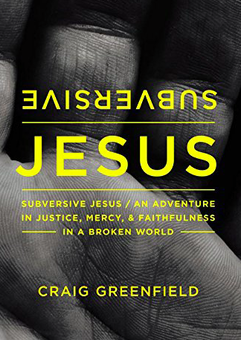Wasted top reads in 2018: Books that made significant impact on my thinking and ministry vision12/31/2018  I read a lot. Sometimes more than one book at a time. At the end of each year, I post the ten or so top books that have been influential to me, which I think other Christians and those in church ministry would benefit from reading as well. I don’t list journal articles, but I read a lot of these as well. But since you all will more likely buy a book than dig up an academic journal, I give you the most significant books I have read in 2018. I don’t have to agree with everything an author has written to be influenced—to rethink, to expand my thoughts on church, the faith, the gospel, mission, evangelism, discipleship, culture, justice, etc. These eleven books make the list because their subject matter will have lasting value on me. And, I believe would greatly help you on your discipleship journey as well. They are not in any particular order; more or less the order I read them throughout 2018. Nonetheless, I strongly suggest the two books by Richard Beck and Michael Goheen’s book on Newbigin’s “Missionary Ecclesiology” as very important and significant reads for those in church ministry. And, I highly recommend Stephen Backhouse's book on Kierkegaard is a fun (enjoyable) read that will help you think about your faith out of the box (out of the Christendom box the church finds itself in at this time). Enjoy. Church and Its Vocation: Lesslie Newbigin’s Missionary Ecclesiology by Michael W. Goheen Church Forsaken: Practicing Presence in Neglected Neighborhoods by Jonathan Brooks, Stranger God: Meeting Jesus in Disguise by Richard Beck Mañana: Christian Theology from a Hispanic Perspective by Justo L. González Loving the Poor, Saving the Rich: Wealth, Poverty, and Early Christian Formation by Helen Rhee Delivered from the Elements of the World: Atonement, Justification, Mission by Peter J. Leithart Saved by Faith and Hospitality by Joshua W. Jipp Exegeting the City: What You Need to Know About Church Planting in the City Today by Sean Benesh Urban Hinterlands: Planting the Gospel in Uncool Places by Sean Benesh Kierkegaard: A Single Life by Stephen Backhouse Unclean: Meditations on Purity, Hospitality, and Mortality by Richard Beck
0 Comments
I am constantly looking for books I can give away or refer to that might move my friends, maybe just a little, to reconsider their understanding of the gospel and its relationship to the poor. Craig Greenfield’s Subversive Jesus: An Adventure in Justice, Mercy, and Faithfulness in a Broken World is, thankfully, one such book. This volume does exactly what I am looking for: it connects Christians to the issues of poverty and to the poor through reflections on the Bible and through the messiness of ministry. Greenfield points out that respectable Christians don't "throw in their lot with the poor” (22), yet he believes, as I do, that “there is a biblical mandate for Christ-followers to become lobbyists for the poor” (139). Subversive Jesus explains wasted evangelism very well, portraying the relationship between the gospel and social action through the ministry illustrations and, as well, through his autobiographical sketches of real life stories among the poor. Subversive Jesus isn’t just another book guilting Christians into helping the poor. It is as much a confession (of the struggles living out a subversive gospel) and story-telling as it is a reflection on the nature of the gospel and the person of Jesus as the New Testament portrays him. The content—yes, the rightfully convicting content—is embedded throughout the book within his family adventures in learning how to live among the poor—and as Christian neighbors. He confesses, “. . . it wasn’t long before we came face-to-face with the messiness of living on the edges of society with those who struggle—for we cannot separate the beauty and goodness of subversive hospitality from its challenges” (55). Greenfield shares their ministry of hospitality, that is opening up his home and dinner-table to the poor, homeless, and messy (and sometimes reckless) individuals who we, too, often turn away in our hearts long before we even have a table to invite them to. We are led into the vulnerability of the Greenfield family as they experience and learn learn some of the tougher aspects of home and hospitality ministry to the poor. He writes, “Those of us who practice subversive hospitality will forever live in the tension between our finiteness, our human limitations, and grace. It will break our hearts when we have to say no or close our doors” (57). Greenfield does not hold back on the exposition, that is, the power of portraying the Jesus of the gospels. He explains, “I began to understand what this upside-down kingdom on earth might look like. For Jesus’ life was bookended by an empire’s standard response to anyone who is a threat: violence and brutal repression” (24). In fact, he is right to call out church people, exposing how we have tamed Jesus to fit our more suburban (I prefer to say, exurban and nonpoor) lifestyles of home and church: “Many of our Sunday schools continue to encourage followers of Jesus to embrace a respectable Jesus, an agreeable teacher with pleasant stories to tell about how to be good. But no one would crucify this Jesus. No one would be threatened by such a bland personal morality. Instead, they’d invite this Jesus over for a cup of tea and a chat about the weather” (25). He reminds us of one of Luke's marks of the church strangely absent today: “God’s grace was so powerfully at work in them all that there were no needy persons among them” [Acts 4:33–34, emphasis added by Greenfield] (52). The stories in the book are not prescriptive, he writes, but are demonstrations of how God worked in his life and, as well, his family’s life. He draws us into the overwhelming sense of hopelessness we can have when we are confronted by the effects of poverty and brokenness: “Who hasn’t felt like this in the face of our broken world? We can’t help feeling overwhelmed when we hear that on billion people live in slums worldwide, or that four hundred busloads of children die every day from preventable illnesses. It’s hard enough to face the challenges of our own impoverished neighborhoods and inner cities” (50). Yet, he is quick to point out that we have put too much reliance on non-church organizations and para-church ministries to deal with the poor and marginalized: “. . . we rely on soup kitchens and institutions. Instead of opening our churches and homes to the hungry, we are taught to “leave it to the professionals.” He says, “this is the way of the empire.” There is, however, hope for the poor in God’s kingdom and among Jesus’ followers. “Jesus promises that even though the empire is a cold and lonely place for the vulnerable, his kingdom on earth will be especially good news for the poor. As followers of Jesus, we need to figure out what that good news looks like as we respond to those who are suffering because of poverty and oppression, whether a beggar on the corner or an orphaned child in a slum halfway around the world” (68). Yet, we choose to live apart from the poor, separated from the people and the effects of poverty in which they, themselves, must—and mostly not by choice—live their everyday lives. “As people of privilege, we make choices every day about where we will live, where we will shop, how we will travel, and who we will spend time with. Often these choices isolate us from those on the margins of society. Our isolation from the poor shapes how we understand poverty, and it drives how we respond to it” (107) Many of us have the power (and platform) to change how we view and approach the poor and the issues of poverty—first in our own lives, then our church life, and, as well, through advocacy and example, in the world around us. But, Greenfield pin points the problem: “Those who hold the most power and authority in society are the least likely to want to change the system that produces poverty” (111). The Greenfield family understands the risk involved with following the subversive Jesus (the Jesus of the New Testament): “We realized at a very personal level that when we align ourselves with the poor and seek to be in solidarity with those Jesus called us to embrace, there will be a cost” (157). If the gospel is subversive to culture and power, what is it about your life as a Christian that is, well, subversive? I highly recommend Subversive Jesus for your own edification, perhaps as a small group reading among your church family. You will be convicted, encouraged, at times angered, and you will cry. But most of all, you will be confronted by the subversive Jesus of the gospels and pierced and humbled by a life (the Greenfield’s) caught up in the beauty, messiness, and ministry to the least among us. Greenfield is the founder and director of Alongsiders International (alongsiders.org), an organization that seeks to mobilize and equip thousands of young Christians in the developing world to walk alongside those who walk alone, especially the orphans and vulnerable children in their own communities. The Greenfields have lived and ministered for more than fifteen years in slums and inner cities in Asia and North America. Subversive Jesus is available on Amazon. And, his first book, The Urban Halo: a story of hope for orphans of the poor, is also available. Both books may also be found on Craig's website, craiggreenfield.com.
|
AuthorChip M. Anderson, advocate for biblical social action; pastor of an urban church plant in the Hill neighborhood of New Haven, CT; husband, father, author, former Greek & NT professor; and, 19 years involved with social action. Archives
February 2024
Categories
All
|
Pages |
More Pages |
|

 RSS Feed
RSS Feed